scroll for more! ⟶
Cinchy Blog / What Are the Different Types of Motorcycle Helmets?
Types of Motorcycle Helmets in Bali Scooter Rental: A Safety Guide Through Paradise
Published: 07 Jun 2025
By Ulfah Alifah
Travel Enthusiast
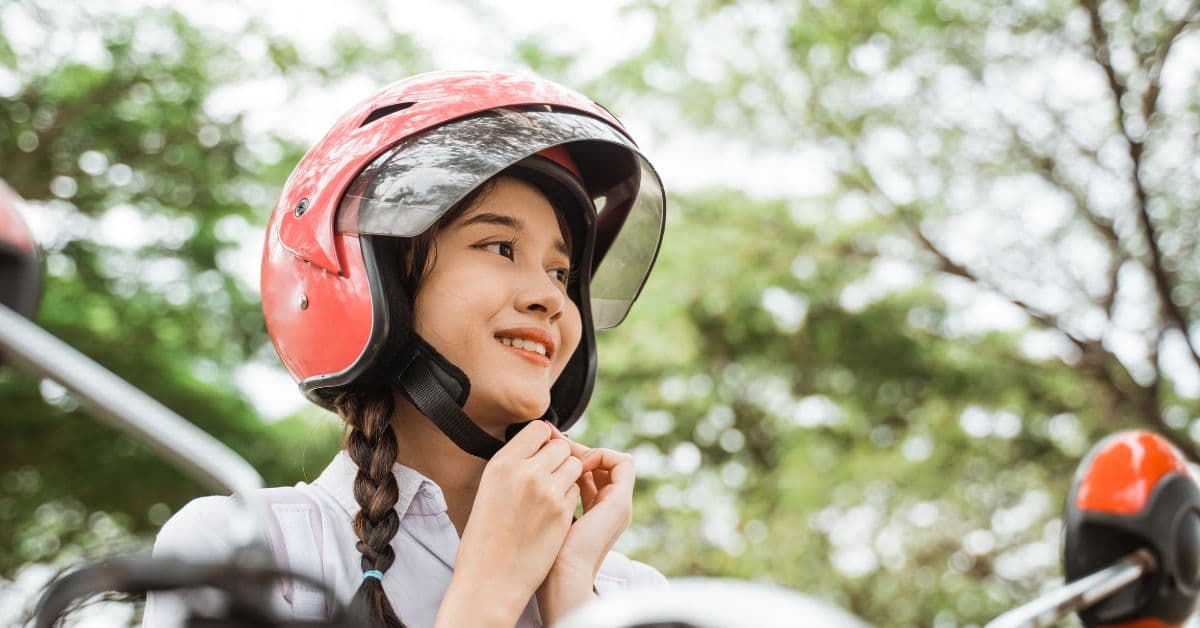
Book Your Ride in Just 1 Minute!
Free Cancellation
24/7 Support
Insurance
Start Date - End Date
Start Time
End Time
Duration
0 Day(s)
When tourists first arrive in Bali and witness the seemingly chaotic dance of scooters weaving through narrow streets, many experience a mix of excitement and apprehension. The freedom of exploring this tropical paradise on two wheels is undeniable, yet the sobering reality of road safety statistics demands careful consideration. With traffic accidents in Bali doubling from 3,602 incidents in 2022 to 7,224 in 2023 (representing a staggering 100% increase), understanding helmet types and safety requirements has never been more critical. This dramatic surge in accidents, with 86% involving motorcycles, highlights why choosing the right helmet when renting a scooter in Bali can literally be a life-or-death decision.
The Stark Reality of Bali's Roads
The picturesque streets of Bali conceal a troubling truth about motorcycle safety. Indonesian National Statistics reveal that motorcyclists account for 73% of deaths and major injuries in traffic accidents across Indonesia, with the most direct cause of death being head trauma. In Bali specifically, the number of fatalities rose from 502 people in 2022 to 632 in 2023, marking a 25.89% increase in deaths. These numbers become even more concerning when considering that the World Health Organization reports over 80% of two-wheeler riders in Indonesia died due to lack of proper head protection in 2019 alone.
For tourists contemplating scooter rental in Bali, these statistics underscore the critical importance of helmet selection. The decision extends beyond mere legal compliance. Wearing a proper helmet meeting safety standards can be the difference between a minor mishap and a tragic outcome.
Understanding Indonesia's Helmet Regulations
Before exploring helmet types, travellers must understand Indonesia's legal requirements. Under Law Number 22 of 2009 on Traffic and Road Transport, riders and passengers not wearing helmets meeting Indonesian National Standards (SNI) face fines up to Rp250,000 or imprisonment for a maximum of one month (Article 291 paragraph 1). Importantly, if the driver wears a helmet but the passenger doesn't, the driver bears responsibility and faces the same penalty (Article 291 paragraph 2).
The regulation specifically mandates helmets meeting SNI standards according to Article 106 paragraph 8, making certification a crucial factor when selecting protection equipment. This legal framework reflects the government's recognition of helmet importance in reducing the motorcycle accident fatality rate, which reached 17-22% in 2023, meaning every five motorcycle accidents could result in at least one death.
Read Also:
Where to Buy a Helmet in Bali? 10 Best Helmet Shops in Bali
What is the 2-2-2 Rule When Fitting a Helmet on Your Head?
How Often Should I Replace My Motorcycle Helmet?
The Complete Bali Helmet Guide: Safety, Legality, and Comfort in Indonesia's Tropical Paradise
Motorcycle Helmet Size Guide in Bali Indonesia: How To Measure & Fit The Right Helmet
How to Choose a Helmet for Riding a Scooter in Bali
Everything About Helmet Certification in Bali: SNI, DOT, ECE, SNELL
Top 3 Child Safe Helmets in Bali: Kids Helmets for Scooter & Motor
Grab a Certified Helmet with Cinchy!
Tired of squinting at dodgy helmets that look like they’ve survived a war (or worse, a previous tourist)? Skip the sketchy markets and rental scams. At Cinchy, every scooter comes with two SNI-certified helmets – cleaned, sanitised, and ready to keep your noggin intact while you explore Bali’s chaos.
👉 Why stress?
✅ SNI-certified = Legal compliance + actual protection
✅ Free with every rental – No hidden costs, no haggling
✅ Hygiene first – Fresh hair nets and sanitised liners
✅ 24/7 support – Because Bali doesn’t sleep (and neither do we)
Click, Chat, Book – Easy as!
🚀 Snag Your Scooter & Helmet Combo Now 🚀
P.S. Prefer a brand-new helmet? Add one for just Rp70,000 (~AU$6.67) – because your head deserves VIP treatment. 😉
Cinchy: Where safety meets “mate, this is too easy” vibes.
For a hassle-free Bali experience, hiring a scooter in Bali from Cinchy is the best choice. Visit Cinchy and get ready to explore Bali with ease and enjoy your holiday to the fullest? Click here to book your scooter?
Types of Motorcycle Helmets in Bali Scooter Rental
In this article, we will tell you about some different types of motorcycle helmets which have been popular for some time.
1. Half Helmets: Minimal Protection for Casual Riders
The most basic option available at Bali scooter rental shops is the half helmet, often preferred by cruiser bike riders and those seeking minimal legal compliance. These helmets cover only the top of the head, offering the most basic protection while meeting minimum safety standards required for legal motorcycle operation.

Half helmets remain popular among some tourists because they're inexpensive and allow maximum airflow during Bali's tropical heat. However, safety experts strongly advise against this option for anything beyond short, low-speed rides. The limited coverage leaves the face, jaw, and sides of the head completely exposed (areas frequently impacted during motorcycle accidents).
Local helmet shops in Bali typically price no-name half helmets between 250,000-300,000 rupiah, making them the most affordable option for budget-conscious travellers. However, given Bali's accident statistics and the prevalence of head trauma as the leading cause of motorcycle fatalities, the minimal protection offered by half helmets makes them a questionable choice for extended touring.
2. Open Face Helmets: The Balanced Middle Ground
Open face helmets, also known as three-quarter helmets, represent a significant safety upgrade from half helmets while maintaining reasonable comfort in tropical conditions. These helmets protect the head and sides of the face but leave the jaw area exposed, typically featuring a visor and sometimes a sunshade for eye protection.
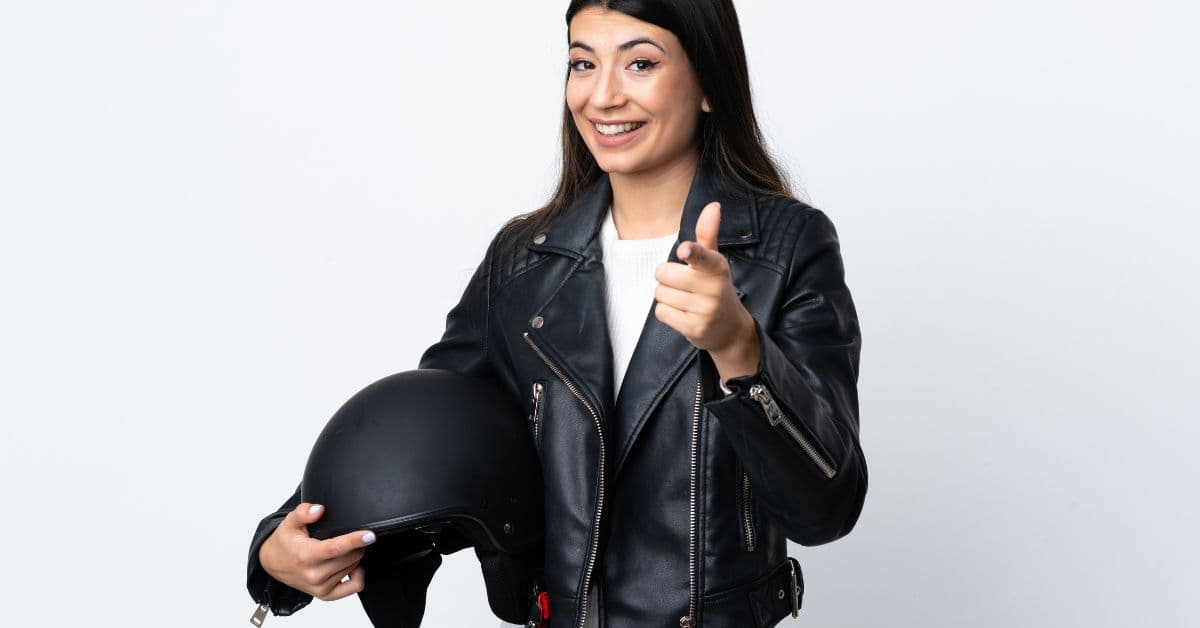
The design offers several advantages for Bali scooter riding. Open face helmets provide protection against sand kicked up by vehicles ahead, flying insects, and minor falls without jaw impact. They're also more tolerable during Bali's frequent traffic jams, as the open design allows better airflow and communication. Additionally, theft concerns are minimal, tourists can safely leave them on handlebars without worry.
Original branded open face helmets from manufacturers like Yamaha, Honda, KYT, and Zeus typically cost between 500,000-800,000 rupiah at Bali helmet shops. These locally manufactured and certified options provide reliable protection while remaining affordable for extended stays. For tourists planning multiple weeks of scooter exploration, open face helmets represent an excellent balance between safety, comfort, and cost-effectiveness.
3. Full Face Helmets: Maximum Protection for Serious Riders
Full face helmets provide comprehensive protection, covering the entire head and face with a fully enclosed design. Statistics show that most impacts during motorcycle falls occur on the jaw area, making full face helmets the gold standard for motorcycle safety. These helmets completely protect against facial injuries, which can be both physically devastating and emotionally traumatic.
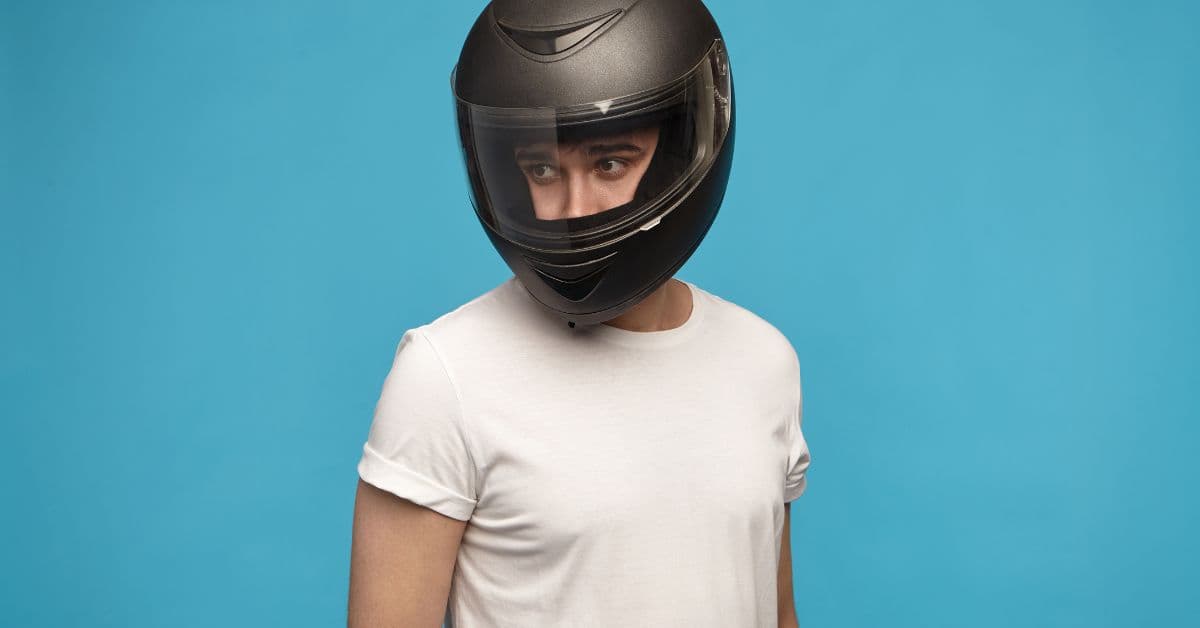
The enclosed design offers additional benefits beyond jaw protection. Full face helmets shield riders from wind, rain, dust, and debris while providing superior impact protection. The integrated visor system protects against UV rays and flying objects while maintaining clear visibility.
However, full face helmets present challenges in Bali's tropical climate. The enclosed design can become uncomfortably hot during traffic jams, though opening the visor or wearing a balaclava can provide relief. Premium full face helmets are also more likely to be stolen, so tourists should take them when leaving their scooters unattended.
Quality full face helmets from reputable brands like Nolan, LS2, and Arai cost significantly more than local options, but counterfeit versions circulate in the market. Genuine imported helmets command premium prices due to import duties, making local certified options more practical for most tourists.
4. Modular Helmets: Versatility with Compromise
Modular helmets combine features of open face and full face designs, allowing the chin bar to flip up for convenience while maintaining full protection when closed. This versatility makes them appealing for tourists who want full face protection but appreciate the ability to communicate easily or take drinks without removing the entire helmet.
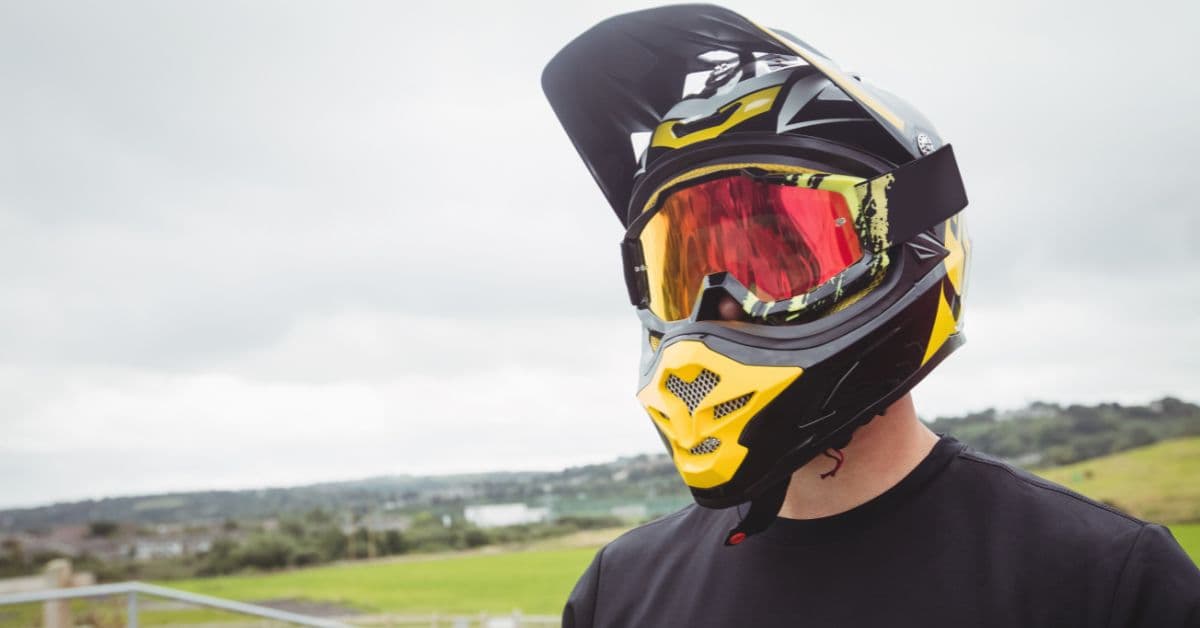
However, modular helmets typically cost more than traditional designs and may not offer the same level of protection as dedicated full face helmets due to the moving parts and potential weak points at the hinge mechanism. For Bali tourists, the added complexity and cost may not justify the convenience benefits.
5. Dirt Bike Helmets: Engineered for Off-Road Challenges

As the name suggests, these helmets are purpose-built for dirt bikes. They feature an extended chin guard and a sun peak, helping to keep sand and dust out of your eyes while you’re riding. Unlike standard helmets, dirt bike helmets don’t have a face shield, which means they offer excellent ventilation and help you stay cool even in tough conditions.
6. Hybrid Helmets
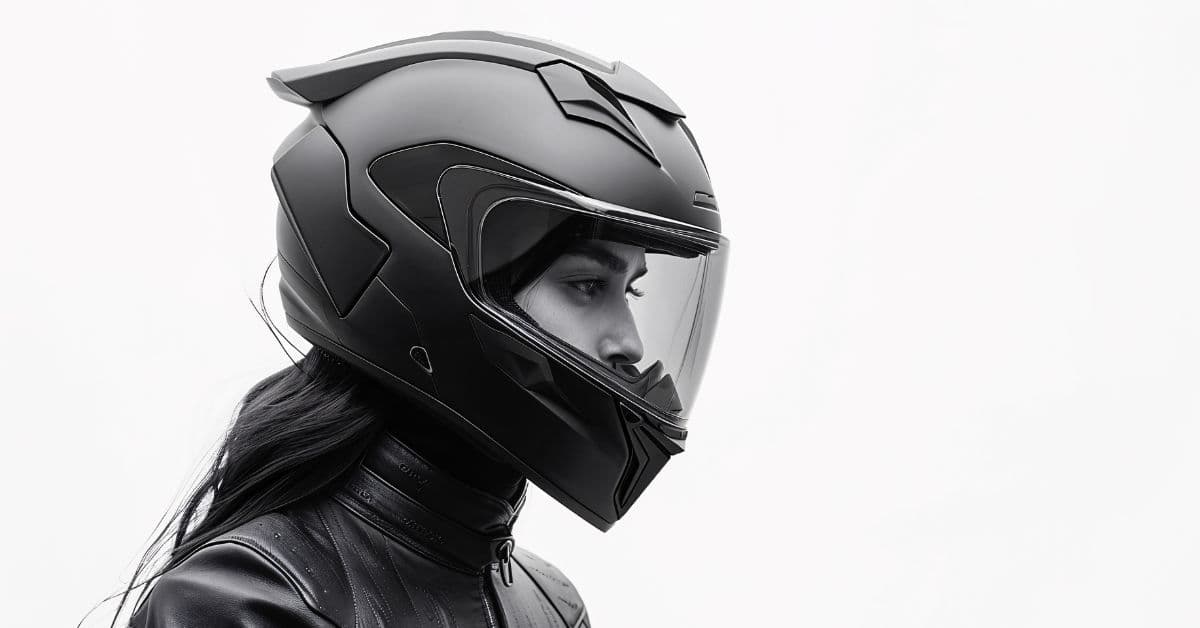
These helmets are a blend of full-face and high-end motocross designs. They come with a face shield, a removable sun visor, and extra ventilation, making them some of the most comfortable options available. In fact, they also offer top-notch protection. Hybrid helmets are popular with riders who switch between on-road and off-road, but they’ll suit just about any type of bike. While they can be a bit pricey, they’re a great choice if you’re after both comfort and maximum safety.
Local Brands and Certification Standards
Bali's helmet market features several reputable local brands that have established strong reputations for quality and safety. KYT, JPN, and INK represent three-letter abbreviations that have become synonymous with reliable protection in the Indonesian market. These brands offer quality helmets ranging from 300,000-400,000 rupiah for half-face designs and 400,000-900,000 rupiah for full-face options.
When purchasing helmets in Bali, tourists encounter two primary certification standards. DOT (Department of Transportation) labelling, introduced by the US Department of Transportation in 1985, allows manufacturers to self-certify their products without reporting test results. While DOT standards provide basic protection, their reliability has diminished over time due to minimal oversight.
SNI (Indonesian National Standards) certification represents the locally mandated safety standard. Helmets sold legally in Bali should display SNI certification, indicating compliance with Indonesian safety requirements. The certification ensures helmets meet minimum protection standards while considering local riding conditions and climate factors.
Shopping Considerations and Practical Advice
Size selection presents unique challenges in Bali's helmet market. The predominant size available is Large, with Medium, Small, or Extra Large typically requiring special orders. This sizing limitation makes trying helmets before purchase essential, as head shapes vary significantly between individuals and sizes can differ between manufacturers.
For tourists planning extended stays, purchasing a personal helmet often proves more economical and hygienic than continuous rental fees. The local helmet market offers three main purchasing avenues: physical stores with higher prices but fitting opportunities, online platforms like Tokopedia with better prices but sizing risks, and second-hand markets through Telegram chats with the lowest prices but hygiene concerns.
Expert recommendations suggest trying helmets at physical stores first, noting the model and size, then purchasing online if significant price differences exist. This approach ensures proper fit while maximising value for money.
Maintenance and Longevity
Proper helmet maintenance extends protection life and ensures hygiene standards. Even new helmets require periodic washing of the removable inner lining, which can be machine washed or taken to local laundries that accept helmet components. The visor represents another maintenance consideration, as scratches and scuffs from normal use impair visibility and cannot be polished (only replaced).
Quality rental companies maintain their helmet inventory through regular cleaning, lining replacement, and visor inspection. The condition of rental helmets often reflects the overall maintenance standards of the rental business, providing insight into their vehicle care practices.
Conclusion
Navigating Bali's roads safely requires more than understanding traffic patterns, it demands investing in proper head protection matched to individual needs and riding plans. With motorcycle accidents claiming 632 lives in Bali during 2023 and the majority involving head trauma, helmet selection represents one of the most critical safety decisions tourists make. Whether choosing basic open face protection for short explorations or investing in full face coverage for extensive touring, the key lies in prioritising certified protection over convenience or cost savings. As Bali's roads become increasingly congested and accident rates continue climbing, the ancient wisdom of "better safe than sorry" has never been more relevant for two-wheeled paradise exploration.
For a hassle-free Bali experience, hiring a scooter in Bali from Cinchy is the best choice. Visit Cinchy and get ready to explore Bali with ease and enjoy your holiday to the fullest? Click here to book your scooter?

